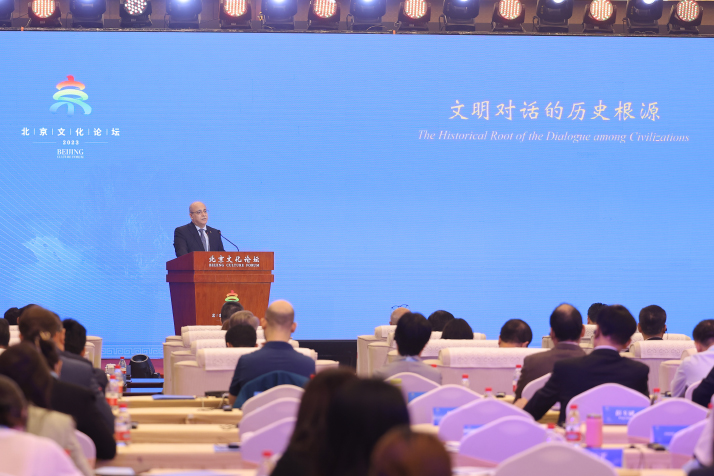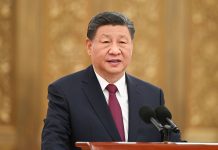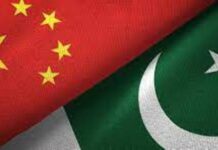
During an era in which global travel was a grand adventure reserved for the few, the British comic actor Charlie Chaplin and the revered Chinese opera artist Mei Lanfang stood face to face in 1930. Their meeting was transformative—they delved into each other’s artistic worlds, exchanging insights, techniques and stories.
This captivating encounter was brought back to life recently in Beijing during the two-day Beijing Culture Forum, which began on September 14, when Eugene Chaplin, the son of Charlie Chaplin, and Mei Wei, the great-grandson of Mei Lanfang, accomplished the meeting their forefathers promised almost 100 years ago.
This meeting is an example of the kind of collaboration that facilitates artistic fusion, which enriches the cultures of both nations and contributes to the building of a truly global community.
Return, renew
Mei Wei’s meeting with Eugene Chaplin is an example of returning to a point of origin in order to make a new beginning, Peng Gang, a history professor and Vice Chair of Tsinghua University, said in his keynote speech at a sub-forum themed Civilization: Mutual Respect and Cooperation on September 15.
“Returning to the origin and starting afresh is a common occurrence in the history of civilization. It is also an important cultural characteristic of modern great powers and major countries. Therefore, in an ever-changing era, it is necessary to pursue the things that possess constant value,” Peng explained.
Peng expressed that the evolving modern civilization of the Chinese nation exhibits five fundamental characteristics in its value system. Firstly, it upholds a collective-oriented societal perspective rather than an individual-centric one. Secondly, it emphasizes development centered around the people rather than capital. Thirdly, it promotes unity and harmony rather than division and confrontation. Fourthly, it advocates mutual benefits between humans and nature instead of conquering nature. Lastly, it embraces the concept of promoting the building of a shared future for humanity, rather than a fragmented worldview characterized by individualistic struggles.
The development process of the modern Chinese civilization is not only a return to the roots of Chinese civilization but also a continuous process of generating new approaches, new concepts and new achievements. It also requires China and the West surpass traditional cultural boundaries and implement innovation through mutual learning, Peng said.
One notable example of cultural exchange between the East and the West is the ancient Silk Road, which connected Asia, Europe and Africa. Along with the exchange of goods, it facilitated the flow of ideas, knowledge and cultural practices between different civilizations. “The Silk Road was one of the most important paths of these exchanges in history, and revealed the common values between the civilizations and the importance of each one of them,” said Hussam Al Husseini, Ambassador of Jordan to China, following Peng at the same forum.
“When I look back at the relations between the Arab and Chinese civilizations throughout history, I don’t find wars or conflicts, but rather trade and interactions. Most important were the intercultural and intellectual tales that facilitated the exchange of many outcomes between these two parts of the world and even opened the door for Islam to enter China and coexist peacefully with Confucianism and Buddhism,” Husseini said.
As the ambassador introduced to the audience, Jordan is located at the meeting point of three continents, Africa, Asia and Europe and its culture shows the fruits of dialogue and interaction among those civilizations.
However, humanity faces common challenges that no country can face alone. “The greatest evidence of this was the spread of COVID-19 in the past three years. There are still others and more serious and common challenges, like climate change and the absence of peace and security,” Husseini added.
Peng expressed similar concerns regarding global challenges: “On the one hand, intense power struggles between different forces make people worry about the future of the world. On the other hand, compared to the past, there are more channels for exchange between different civilizations.”
“History tells us that many nations vanished while facing similar challenges. But it also tells us the story of our survivors when we work together, and our human race needs more than just togetherness in times of crisis,” Husseini said, concluding “we need to be united by our common human and moral values that we draw from our common past. And it’s our responsibility to remind ourselves and our future generations that these are the rules for human civilizations and the core principles of the dialogue that have kept the human race thriving.”
“Conflicts arise when there are economic resources to be shared among oneself and others. However, in most other aspects, we can foster cooperation,” Deputy Secretary General of the Shanghai Cooperation Organization Sohail Khan told Beijing Review during the forum. “Political or diplomatic issues may pose challenges when engaging in discussions, but I do not believe that China faces problems with any other nation. China actively engages in dialogue with every country,” Khan said.
Khan said he believes cultural dialogues provide great opportunities and flexibility for countries with conflicts to talk with one another, and he hopes the forum will encourage more countries to participate in cultural dialogue.

Booming exchange
After the Beijing Culture Forum, two other global cultural forums or seminars initiated by Chinese organizations followed. On September 16, education experts from around the world called for enhancing cultural exchange for the building of a community with a shared future for humanity at the Global Civilizations Forum, organized by Beijing Foreign Studies University (BFSU). From September 16 to 18, over 300 experts and diplomatic envoys from China and other countries that have river basins attended the 2023 World Great Rivers Civilizations Forum in Zhengzhou, Henan Province, with the major host being the Ministry of Culture and Tourism. These exchanges can be viewed as significant responses to the Global Civilizations Initiative, proposed by Chinese President Xi Jinping in March.
Addressing the Global Civilizations Forum, M.M. Pathmalal, Vice Chancellor of the University of Sri Jayewardenepura, Sri Lanka, discussed the foundational role of the concept of “community” in human civilization.
He was quoted by China Daily as saying the longstanding disparities in the international community caused by race, gender and economic status cannot be eliminated solely through technological advancements. He called for more connections among nations that highlight the importance of “community.” –The Daily Mail-Beijing Review news exchange item




